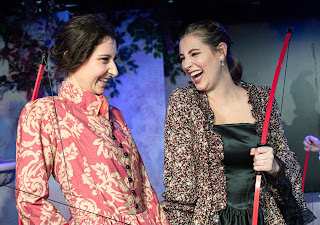Comedy both hermetic and open: Bard Fest's 'Love's Labour's Lost' runs the gamut
A touch of modernism — self-consciousness about what a stage play is — helps redeem for today the topical tangle of Shakespeare's early comedy "Love's Labour's Lost."
Indy Bard Fest negotiates the obscure aspects of a work that was probably intended for court performance, allowing for endless word play and larded with expressions that have disappeared from the mainstream. It's a style that would have baffled even the groundlings at Shakespeare's Globe. But reminders of the play's artificiality are relentless, and the implausible is no obstacle to making the action believable over the short term.
 |
| Amateur archers:Rosaline and the Princess chat. |
Seen at the Cat Theatre Friday night near the end of its run, the production embraces the nonsensical premise on which the play is based — and everything that ensues from that: a royal whim to gather lusty, highly placed men around the monarch to abjure the company of women in favor of three years' worth of study. The imposture blows up in service to power politics as well as the perennial pull of romantic love.
It has slipped the King of Navarre's mind that just after he and three aristocratic buddies have sworn to follow the scholarly life and avoid women, he is due to play host to the Princess of France to settle a land dispute between their nations. The impractical plan has been undermined from the start.
"Love's Labour's Lost" is thus based on an unlikely premise. Resting upon such a flimsy foundation, the play gives free rein to directors, as long as they are willing to make most of the linguistic underbrush, the text's jests and quibbles, somewhat intelligible to audiences. Credibility is fleeting, which may explain why the clown character of Costard can justifiably be so grotesquely interpreted by JB Scoble that I wondered how such a character — almost deformed, gnomelike and bellowing — would not alarm his fellows. The portrayal was funny, nonetheless, despite its excess.
Still, I was jolted somewhat by the deliberately ragged performance of the play's final song, a continuation of the risible amateurism of a visiting Spanish soldier's earlier entertainment about the Nine Worthies (legendary heroes of Western culture). The song here is delivered slapdash, rather than in a version reflecting the wise perspective that provides a peaceful end to the dramatic turmoil. Still, there is a well-sung chorus to Cam Collins' tune at the very end that satisfied my need for a dash of sentimentality.
Director John Johnson has drawn out a consistent camaraderie among members of each of the two groups. Shakespeare's women seem more connected to the real world, and they are considerably wilier than the lovelorn men. There is consistent bonding within each group, and the production succeeds in large part because we can see what gives each of them its internal cohesion.
Aaron Jones is the King, around whom Longaville (Chris Bell), Dumaine (Colby Rison) and Berowne (Matt Hartzburg) strive to stay true to their pledge. He has addled himself through his wrongheaded idealism, drawing superficial loyalty to the scheme from all except the circumspect Berowne. Hartzburg filled this vital role eloquently in a manner that seemed to speak, as several critics have observed, for the playwright himself.
The play's two broad male caricatures are ably embodied to the nth degree. Their costumes project their outsize personalities, and indeed all the costumes (uncredited in the program) are suitable and varied. Dan Flahive fusses, spouts Latin and struts as the outrageous pedant Holofernes. John Mortell maintains a florid, believably Spanish accent throughout his portrayal of the young playwright's take on the "braggart captain" stereotype inherited from Roman comedy. This one, Don Adriano de Armado, is in a word "thrasonical," as Holofernes calls him, a lovely adjective that first appeared in English about the time Shakespeare was born, my dictionary tells me.
Johnson himself plays the French courtier Boyet, who supports
the ladies' shrewd defensiveness as potentially vulnerable women.
The fact that they are not fooled, in one hilarious scene, by the
cavorting of their suitors in the guise of visiting Muscovites isn't
surprising, and it conveys their calm patience about gaining the upper
hand. Jennifer Kaufmann displayed poise and regal self-control as the Princess, and her attendants — Maria (Brittany Davis), Katherine (Abigail Simmon) and Rosaline (Rachel Kelso) — were catty, observant lovers-in-waiting. Their guest accommodation is a tent in a field, and they make the best of it.
Through the very end, the four women display patience and self-possession. There they tell their respective wooers what they must do for a year to demonstrate that they are deserving of returned affection. Twelve months of devotion, imagine that, from men who have shown themselves so poor at delaying gratification!
"That's too long for a play," Berowne sensibly observes in his last line. It's the play's most obvious nod in the direction of modernism's acknowledgment that art stands at a significant remove from life. So why not acknowledge that within the art itself? "Love's Labour's Lost" shows how. This production rejoices in communicating home truths about love while going all out in style and commitment to artificiality at its silliest and most word-besotted.



Comments
Post a Comment